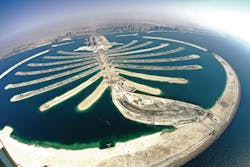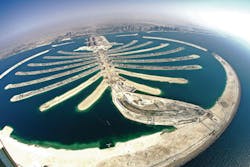Palm Jumeirah seawater desalination plants underway
ACWa Services to build US$ 90-million desalination plants on the man-made Palm Jumeirah island in Dubai, United Arab Emirates.
Peter Ripley
ACWa Emirates LLC, a subsidiary of the UK-based ACWa Services, completed the detailed design for a US$ 90-million order to build two identical Seawater Desalination Plants on the crown of the prestigious “Palm Jumeirah” – the palm-shaped development created off the coast of Dubai (UAE). Palm Water, the utility company for the development, awarded the contract to ACWa.
The two new desalination plants, scheduled for completion in 2007, will produce 32,000 cubic meters per day of high quality drinking water for the residents of luxury villas and apartments and visitors to the hotels and leisure facilities currently being constructed on what is often referred to as “The Eighth Wonder of the World.” The island is the first of three to be established in the area to increase Dubai’s shoreline by 120 km and create a large number of residential, leisure, and entertainment areas.
The ACWa desalination plants will include screening, ultrafiltration, reverse osmosis (RO), second stage RO polishing, disinfection and remineralization processes, designed to turn raw, saline seawater into high quality water supplies for residential consumption and a variety of island service facilities.
The optimal process design, delivered by ACWa, was required to overcome a number of challenges. In the early years of operation, Palm Jumeirah will still have substantial construction activities and raw water drawn from the sea will probably vary in quality. The ACWa design uses specially selected water quality monitors in the intake structure to provide early warning of changes in raw water quality and allow necessary operational adjustments to the treatment process.
Reverse osmosis membranes are at the heart of the desalination treatment process and their reliability and working life is dependent on the effective pretreatment of the raw water. This will be achieved by the use of ultrafiltration membranes - a breakthrough on plants of this size that offers clear benefits over more conventional technologies. Twelve trains of ultrafiltration will be provided, including around 10 percent potential redundancy.
The UF system will protect the RO membranes and ensure that seawater characteristics are suitably adjusted for RO treatment. The design capacity will be achieved with duty UF units only and will include down-time (non-production in time) for periodic, automatic cleaning and integrity testing. The units are arranged in such a way that total production is maintained without the need for a standby ultrafiltration unit.
Giving special consideration to rising energy costs, the plant will include equipment to recover energy from the reject brine stream. The Energy Recovery System will transfer energy at high efficiency from RO plant brine to the low-pressure ultrafiltration filtrate feed pumps.
ACWa has designed and installed RO plants for water companies and private enterprises throughout the UK and the Middle East, particularly in arid regions where potable water is in extremely short supply. This ambitious project is expected to provide sustained economic expansion for Dubai and help the emirate enhance its position as a premier tourist destination. ACWa set up its Dubai office in July 2004 and has increased staff to more than 20 staff members based in the United Arab Emirates.
Author’s Note
Peter G. Ripley is the managing director of ACWa Services, based in Skipton, UK.
Seaguard membranes selected for SWRO pretreatment
ACWa Emirates, the Dubai-based EPC contractor, ordered Norit X-Flow’s Seaguard membranes for pretreatment of the two seawater reverse osmosis desalination plants to be built to supply water for The Palm Jumeirah project in Dubai. The membranes will purify 184,000 cubic meters of raw seawater each day, which results in 64,000 cubic meters per day of clean drinking water after RO treatment. The Seaguard was first launched in January 2006 as the first dedicated membrane for ultrafiltration pretreatment for seawater reverse osmosis. Recent successes achieved by Norit show a breakthrough of dual membrane treatment for large-scale seawater desalination. Visit the website: www.norit.com.

